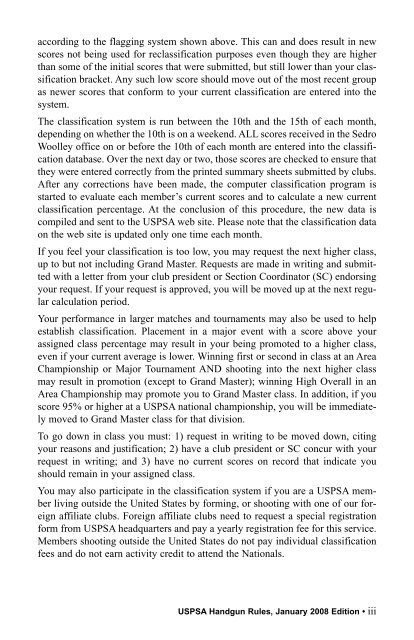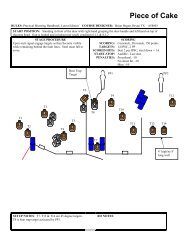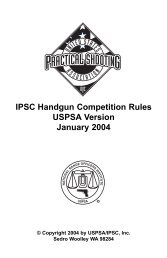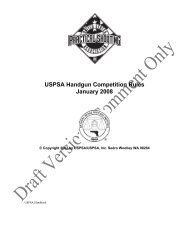USPSA Handgun Competition Rules January 2008
USPSA Handgun Competition Rules January 2008
USPSA Handgun Competition Rules January 2008
Create successful ePaper yourself
Turn your PDF publications into a flip-book with our unique Google optimized e-Paper software.
according to the flagging system shown above. This can and does result in new<br />
scores not being used for reclassification purposes even though they are higher<br />
than some of the initial scores that were submitted, but still lower than your classification<br />
bracket. Any such low score should move out of the most recent group<br />
as newer scores that conform to your current classification are entered into the<br />
system.<br />
The classification system is run between the 10th and the 15th of each month,<br />
depending on whether the 10th is on a weekend. ALL scores received in the Sedro<br />
Woolley office on or before the 10th of each month are entered into the classification<br />
database. Over the next day or two, those scores are checked to ensure that<br />
they were entered correctly from the printed summary sheets submitted by clubs.<br />
After any corrections have been made, the computer classification program is<br />
started to evaluate each member’s current scores and to calculate a new current<br />
classification percentage. At the conclusion of this procedure, the new data is<br />
compiled and sent to the <strong>USPSA</strong> web site. Please note that the classification data<br />
on the web site is updated only one time each month.<br />
If you feel your classification is too low, you may request the next higher class,<br />
up to but not including Grand Master. Requests are made in writing and submitted<br />
with a letter from your club president or Section Coordinator (SC) endorsing<br />
your request. If your request is approved, you will be moved up at the next regular<br />
calculation period.<br />
Your performance in larger matches and tournaments may also be used to help<br />
establish classification. Placement in a major event with a score above your<br />
assigned class percentage may result in your being promoted to a higher class,<br />
even if your current average is lower. Winning first or second in class at an Area<br />
Championship or Major Tournament AND shooting into the next higher class<br />
may result in promotion (except to Grand Master); winning High Overall in an<br />
Area Championship may promote you to Grand Master class. In addition, if you<br />
score 95% or higher at a <strong>USPSA</strong> national championship, you will be immediately<br />
moved to Grand Master class for that division.<br />
To go down in class you must: 1) request in writing to be moved down, citing<br />
your reasons and justification; 2) have a club president or SC concur with your<br />
request in writing; and 3) have no current scores on record that indicate you<br />
should remain in your assigned class.<br />
You may also participate in the classification system if you are a <strong>USPSA</strong> member<br />
living outside the United States by forming, or shooting with one of our foreign<br />
affiliate clubs. Foreign affiliate clubs need to request a special registration<br />
form from <strong>USPSA</strong> headquarters and pay a yearly registration fee for this service.<br />
Members shooting outside the United States do not pay individual classification<br />
fees and do not earn activity credit to attend the Nationals.<br />
<strong>USPSA</strong> <strong>Handgun</strong> <strong>Rules</strong>, <strong>January</strong> <strong>2008</strong> Edition • iii






